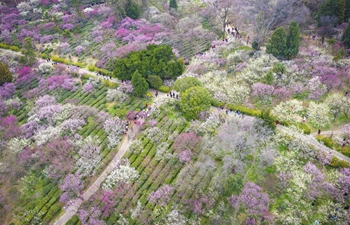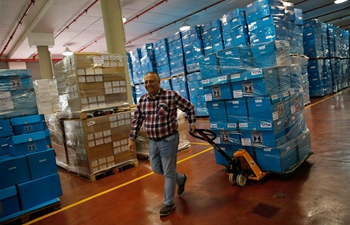by Burak Akinci
ANKARA, March 9 (Xinhua) -- In Turkey, nearly 50 percent of the cost of a bottle of wine goes straight to the government's coffers with successive taxes levied on alcoholic beverages.
"There is a fresh perspective ahead for quality Turkish wines in the world as people are searching for new tastes rather than traditional wines such as a Bordeaux," Olus Molu, founder and proprietor of Vinolus, a boutique producer in Cappadocia in central Turkey, said to Xinhua.
Vinolus was founded in Kayseri province in 2007 and has a maximum annual production of 45 tonnes consisting of two categories of local and international grape varieties such as Kalecik Karasi, Narince, Chardonnay or Roussane.
Olus made sure that she had an internationally-renowned organic certificate for her farm where she uses only what she grows in bottles.
"First I was driven by a commercial need to be successful but then it turned to pure dedication and that is in fact what you need to produce good wine," she said.
Today, Turkey has the fifth-largest vineyard area in the world, with a loam conducive to delicious varietals, used however mainly for table grapes and not winemaking.
Turkey also ranks sixth globally in grape production. But its winemaking industry comes in at a lowly 45th, just ahead of Belarus, Cuba, and India, according to the Wine Institute.
In recent years, things have gotten difficult for Turkish vintners.
Teetotaler President Recep Tayyip Erdogan's government placed tough restrictions on domestic alcohol marketing, where it is now totally banned to publicize any kind of alcoholic beverage or tobacco products in the country.
Such products are now automatically blurred out in television shows.
Islam forbids alcohol consumption and a succession of hefty taxes have been imposed on alcohol since 2012, the very recent being an additional 13.5-percent special consumption tax levied since Jan. 1.
The government insists that such regulations are aimed at protecting public health and preventing minors from drinking.
In contradiction, while alcohol is restricted within Turkey, the government has supported the export of its wines, but the sales are very modest. But the depreciation of the Turkish currency since last year might well be a boon for the Turkish wines.
"For a big company, this ban can be surmountable by the fact that consumers already know the brand, but for small enterprises like ours, it's making life difficult," said Olus, adding the fact that Turkey is by no means a big-wine drinking country.
Despite the current social stigma attached to alcohol and heavy taxes, Anatolia has a rich oenological history.
The Hittites, the most ancient Indo-European culture which inhabited actual Turkey came in contact of grape and wine as early as 2500 B.C., according to historians.
Anatolian winemaking history stretches well beyond the classic civilizations of Greece and Rome that cemented the popularity of wine.
Currently, there are over 100 wineries operating in Turkey, roughly half of which are small producers making less than 250,000 bottles a year.
Current economic hardships on the back of a currency crisis which saw the Turkish lira sink 30 percent against the U.S. dollar since last summer are also a factor added to the struggle of wine makers.
Yet, Turkish producers are trying to capture foreign markets and palates with a range of exotic and ancient varietals which are unfamiliar to European and America customers.
Okuzgozu (Bull's eye) and Bogazkere (throat-burner) are some of the stars of native varieties of Turkey and they are typically blended together. There's also the Kalecik Karasi, the grape named for the Kalecik village, native to outside of Ankara.
These indigenous but underrated red grape varieties have received critical acclaim by sommeliers and in winemaking conventions across the globe.
"There is a real opportunity here. Turkey can encourage gastronomic tourism and people who are ready to pay for new things could visit Turkish winemakers and taste the local wines," said Olus.
The arrival of tourists in winemaking regions spread across western, central and eastern Turkish provinces may provide income and sustenance for local businesses and assure the existence of the millennial Anatolian wine culture, she added.













